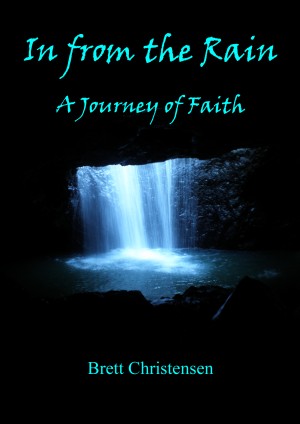Interview with Brett Christensen
Published 2015-01-30.
Do you remember the first story you ever wrote?
Yes. It was very forgettable. My teacher was not impressed at all, but she didn't have the insight to recognise literary greatness in its infancy. Of course, it wasn't her job to spot it, and there wasn't any in her classroom, so her sacking was quite unfair.
Describe your desk
I have a few desks. The one I'm at at the moment looks like it was built in 1971, covered as it is in brown laminex. With one drawer and one cupboard, it probably debuted in an accountant's office, so I imagine it's much happier these days, having (aside from a few loose scraps of paper) only a printer, keyboard and screen on it. (We shan't speak of the speakers.)
The desk I sit at most would make a challenging archaeological dig, and it probably rates as a moderate fire hazard. Last I saw it, the desktop was a cream colour. There's a mug in the bottom drawer, with cup-o-soup packets. Help yourself. (Just be careful of the snake.)
Where did you grow up, and how did this influence your writing?
My first eBook, "In from the Rain", answers the first part of this question pretty comprehensively. Have a read; it's worth every cent it costs. But I know my home town influenced my writing very strongly, because everybody spoke and wrote English. If you wanted to be heard or read, you had to speak and write English. Our particular dialect was Strine, or "Australian English". So now, by and large, that's the only language I write in.
What is your writing process?
It varies. For non-fiction, some books start as class (teaching) material, others as a series of articles. Most of my children's fiction started in the dark, with me telling a story to my children. This is quite like a band trying out new material on live audiences, to see what works and what doesn't. The trouble is remembering what the story was later, when the light is on and I can type it. Sometimes I've had to get my children to remind me how it went. (Children are great at spotting when you get something in the story wrong!) I don't tie myself to how it went when I told it; I let the imagination loose as I type.
From there, it's the long process of draft and redraft, letting it sit and mature and coming back fresh to it, and redrafting. This never ends unless you publish it, so publishing is a great way of setting yourself free from your creation. The little hatchling leaves the nest, so you can't mother it any more.
How do you approach cover design?
I have the concept in my head, and if it's simple I'll put it together myself. If that looks crumby, I'll give it to a designer to fix up my fiasco. If the concept I have in my head is beyond my power to put together, I go straight to the designer.
What are you working on next?
Another book.
What do you read for pleasure?
Science and history stuff, biographies and spiritually uplifting material of any kind. If I read fiction, it's usually short stories, as I don't like fiction in large doses. And in case you're going to ask, my favourite story is "The Open Window" by Saki. It has been for decades.
"Bertie, why do you bound?"
Exactly!
What is your e-reading device of choice?
One that's given to me as a present.
Smashwords Interviews are created by the profiled author or publisher.

